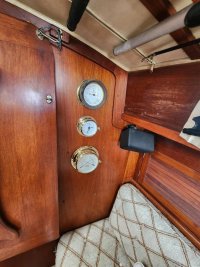We haven’t measured Kotona exactly but from looking at photos from the last haul out, 5’ or thereabouts looks right.
I know the distance from the bow roller to the waterline is right at 5’, we measured that for anchor rode calculations. And that looks to be, in the photos, roughly the same as the waterline to the keel bottom. Give or take a few inches for perspective; but I don’t think it would be over a foot in error.
The specs Sailboatdata shows are the same as in the original brochure. In the brochure an optional deeper draft is not mentioned. I’d go with the 4.9’.
There a copy of the original brochure in the Resources section here.
I know the distance from the bow roller to the waterline is right at 5’, we measured that for anchor rode calculations. And that looks to be, in the photos, roughly the same as the waterline to the keel bottom. Give or take a few inches for perspective; but I don’t think it would be over a foot in error.
The specs Sailboatdata shows are the same as in the original brochure. In the brochure an optional deeper draft is not mentioned. I’d go with the 4.9’.
There a copy of the original brochure in the Resources section here.



